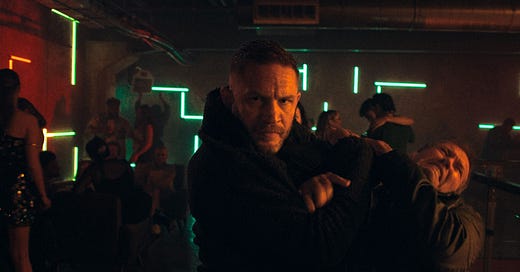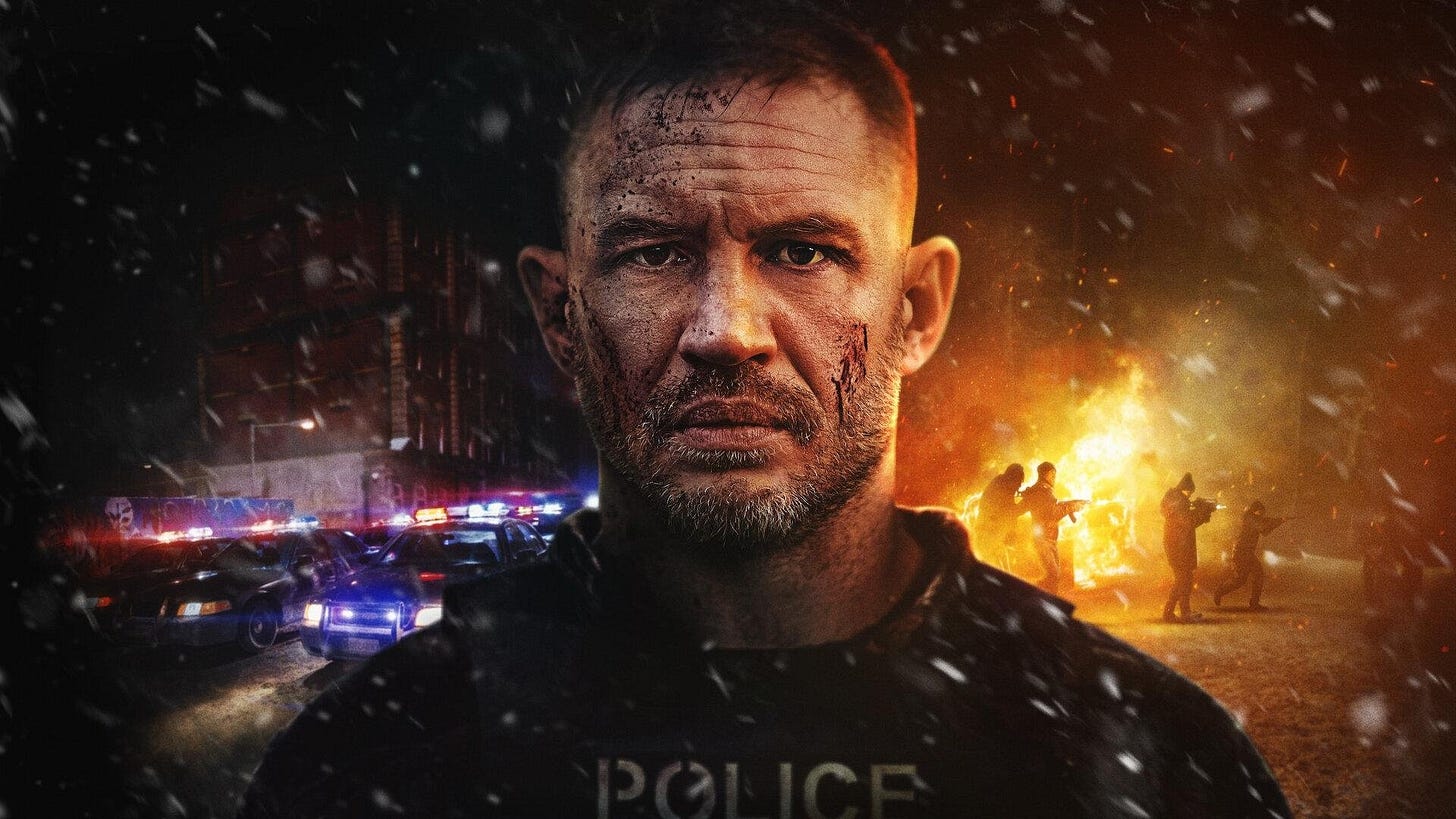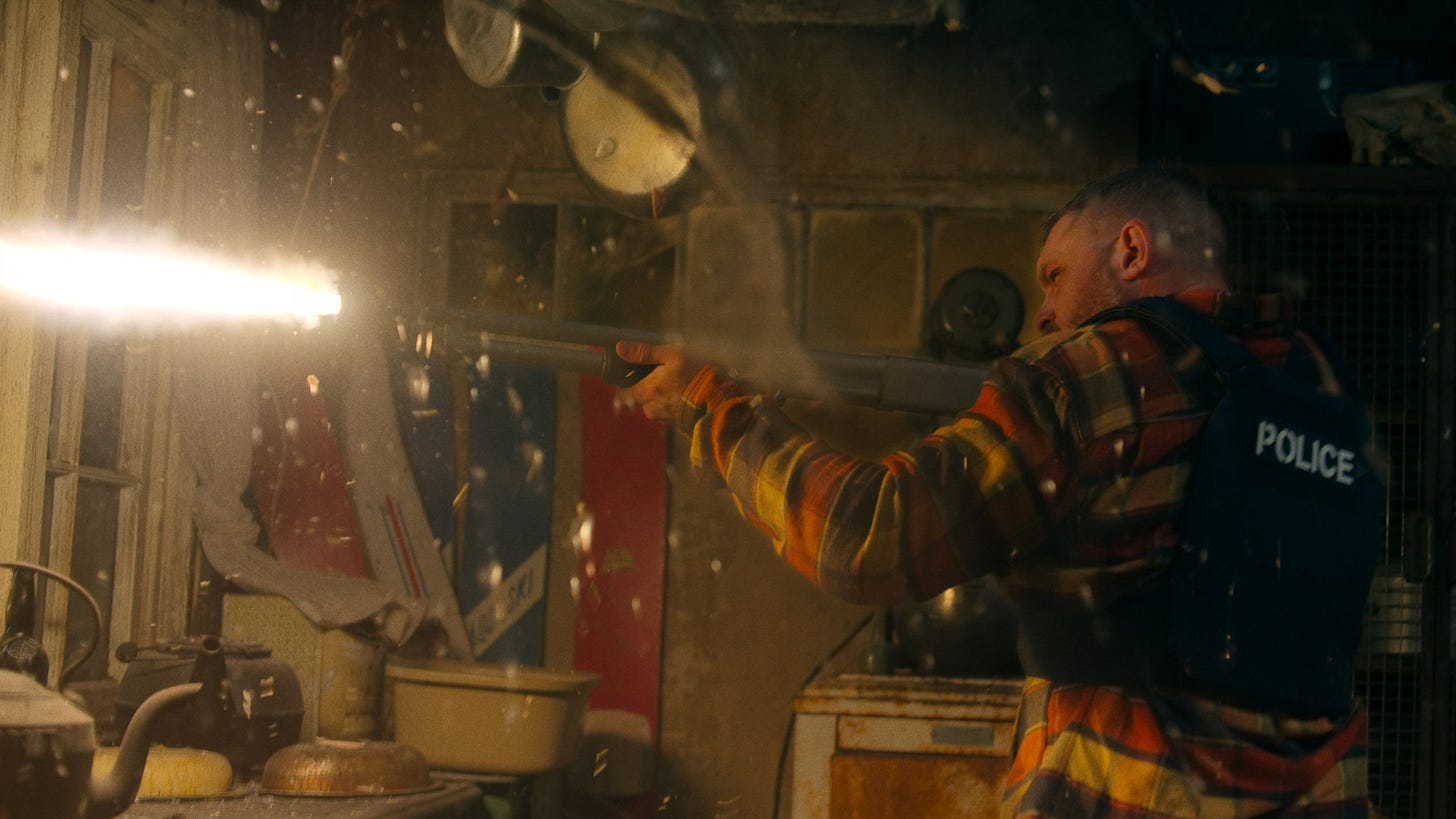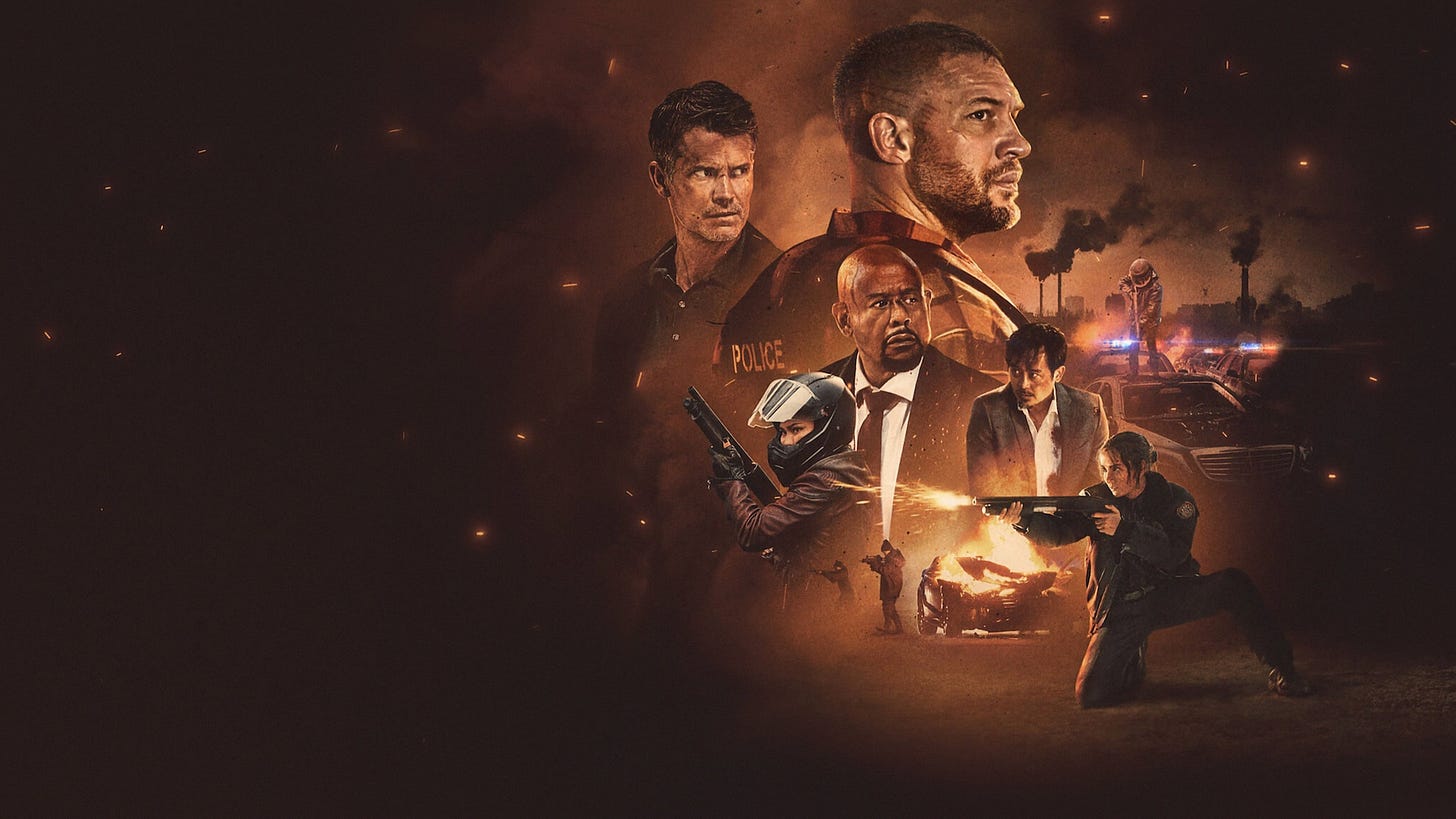Eu teria desistido de Caos e Destruição se não fosse o talento de Gareth Evans para encenar sequências de ação. Não desistir no sentido de desligar o televisor e caçar outra coisa para fazer da minha vida, mas de abrir mão do envolvimento emocional com a trajetória de um policial que já conheço de outras oportunidades. Walker (Tom Hardy) é um policial corrompido, enquadrado com a cabeça afundada entre os ombros curvados, enquanto o prólogo trabalha para expressar com imagens picotadas aquilo por que Walker se arrepende, um crime que será explicado pela narrativa no instante expositivo que atenuará a responsabilidade de Walker. Antes de eu pincelar o roteiro, este é um dos motivos pelo qual o filme desceu quadrado: apesar de andar no terreno acinzentado do bem e mal, do ético e antiético, Evans sempre encontra uma forma de abrandar os crimes dos personagens por que crê que devamos ter uma maior empatia, e agravar os crimes dos personagens por que crê que devamos antipatizar.
Na prática, em um mundo onde não há mocinhos, salvo a policial Ellie (Jessie Mei Li), o filme tenta apagar o passados com atos praticados no presente. No roteiro, Walker é o “pai do ano”, que compra qualquer presente para a filha que não vê há muito tempo, na noite do natal. Com a sua fisicalidade truculenta e de forma econômica, Tom Hardy estabelece o mínimo que precisamos saber sobre seu personagem convencionalmente amargurado. A montagem reforça o óbvio: no instante em que é citado “dinheiro sujo”, a ação corta para a esposa que havia mentido que a filha estava dormindo (ela está na sala, brincando com os brinquedos de verdade que ganhou), para que Walker não fosse à sua casa. Talvez ele nem fosse, pois Walker recebe a chamada de múltiplo homicídio: o filho da tríade, que comanda o tráfico de drogas nas ruas da cidade, foi assassinado, e todas as evidências indicam a autoria do bande de Charlie (Justin Cornwell), o filho do prefeito da cidade (Forest Whitaker), eleito com o slogan de “limpar a cidade”. Esta situação piora quando o prefeito Lawrence exige que Walker proteja o seu filho.
A realidade é que nós já sabemos que há caroço nesse angu: Charlie não é o autor do crime, mas o bode expiatório conveniente. Não precisamos ter PhD, nem do instante embaraçoso em que a direção tenta mostrar que Walker é um investigador eficiente, apesar dos pesares. Com o lápis na orelha, Walker fecha os olhos para imaginar o que pode ter acontecido na cena do crime, o momento no qual Evans revela o flashback do ataque à tríade. Foi exatamente aí que pensei em desistir emocionalmente do filme, e se não o fiz, foi pela curiosidade em saber como que seria desatado esse nó, que inclui anda a milícia e o crime organizado. Timothy Olyphant, Luis Guzmán, Yeo Yann Yann e Sunny Pang, dentre outros, interpretam personagens com uma profundidade rasa em uma história sobre a traição, da qual a corrupção é espécie, e pais e filhos.
Walker, Lawrence, Raul e a Grande Irmã são pais dispostos a sacrificar por filhos, ou por quem trata como filhos. Evans encontra um elemento comum que reúne as ações dos personagens no período de natal, embora a temática seja martelada com a mesma sutileza dos efeitos visuais computadorizados com que são encenadas as perseguições de carro. A propósito, que troço pavoroso! Até um carro em alta velocidade, cruzando uma avenida não muito movimentada - uma acrobacia corriqueira, dentro da arte dos dublês -, é criado em uma computação gráfica de baixa qualidade que é também usada na cena inicial, que posiciona a câmera rente ao asfalto como fez Operação França um meio século atrás, apenas para arruinar tudo com o mau acabamento de pós-produção. Um risco quando consideramos que esse é o trecho em que o público decide se irá, ou não, investir na narrativa.
Mas Evans se recupera. No cinema de ação do diretor, não são somente os atores que lutam de uma forma coreografada, a câmera também se move. Em vez de permanecer estática, assistindo ao talento de artistas de artes marciais, a câmera desafia a própria gravidade, alternando o eixo da ação (do horizontal ao vertical), rotacionando para lá e para cá em um ritmo incessante como se estivesse virando a cabeça no susto, retratando a voadora com ambas as pernas de Walker e o movimento do balde de gelo convertido em uma arma letal. A cena na danceteria namora com a de John Wick 4, da forma como o nascer do sol alaranjado no horizonte remete ao cinema de ação dos anos oitenta, na Gotham sem Batman que são as ruas da cidade.
Se citei John Wick, Evans peca pela obsessão pela contagem de corpos - que se tornou popular graças à franquia de ação. Ele está disposto a preferir números, e quanto mais capangas mortos de formas criativas e ágeis, melhor, em detrimento de injustificáveis excessos, quando duas dúzias de personagens não são páreo para só três. A sensação é de que a Tríade tem um exército nas ruas, e aqui não se trata de uma hipérbole. A ação perde um tico da beleza da arte marcial e troca de tiros bem encenada. Talvez seja aí o ponto em que o filme derrape irreparavelmente… uma derrapagem computadorizada e que não é salva nem pela ação derradeira de Walker.
Havoc, English Review
I would have given up on Havoc if it weren't for Gareth Evans' talent for staging action sequences. Not giving up in the sense of turning off the TV and looking for something else to do with my life, but giving up on the emotional involvement with the trajectory of a police officer I've already known from other opportunities. Walker (Tom Hardy) is a corrupt police officer, framed with his head sunk between hunched shoulders, while the prologue works to express with chopped-up images what Walker regrets, a crime that will be explained by the narrative in the expository moment that will mitigate Walker's responsibility. Before I brush up on the script, this is one of the reasons why the film fell flat: despite treading the gray terrain of good and evil, ethics and unethics, Evans always finds a way to soften the characters' crimes because he believes we should have greater empathy, and aggravate the characters' crimes because he believes we should dislike them.
In practice, in a world where there are no good guys, except for police officer Ellie (Jessie Mei Li), the film tries to erase the past with acts committed in the present. In the script, Walker is the “father of the year”, who buys any present for his daughter, whom he hasn’t seen for a long time, on Christmas Eve. With his truculent physicality and in an economical way, Tom Hardy establishes the minimum we need to know about his conventionally bitter character. The editing reinforces the obvious: the moment “dirty money” is mentioned, the action cuts to the wife who had lied that her daughter was sleeping (she is in the living room, playing with the real toys she received), so that Walker wouldn’t come to her house. Maybe he didn’t even go, because Walker receives a call about a multiple homicide: the son of the triad, who controls the drug trafficking on the city streets, was murdered, and all the evidence points to the perpetrator being Charlie’s gang (Justin Cornwell), the son of the city’s mayor (Forest Whitaker), who was elected with the slogan of “cleaning up the city”. This situation gets worse when Mayor Lawrence demands that Walker protect his son.
The reality is that we already know that there is a problem with this: Charlie is not the perpetrator of the crime, but a convenient scapegoat. We don't need a PhD, nor the embarrassing moment when the director tries to show that Walker is an efficient investigator, despite everything. With a pencil in his ear, Walker closes his eyes to imagine what could have happened at the crime scene, the moment in which Evans reveals the flashback of the attack on the triad. It was exactly at that point that I thought about giving up on the film emotionally, and if I didn't, it was out of curiosity to know how this knot would be untied, which also includes the militia and organized crime. Timothy Olyphant, Luis Guzmán, Yeo Yann Yann and Sunny Pang, among others, play characters with shallow depth in a story about betrayal, of which corruption is a species, and parents and children.
Walker, Lawrence, Raul and Big Sister are parents willing to sacrifice for their children, or for those they treat as children. Evans finds a common element that unites the characters' actions during the Christmas period, although the theme is hammered home with the same subtlety as the computerized visual effects with which the car chases are staged. By the way, what a terrifying thing! Even a car speeding along a not very busy avenue - a common stunt within the art of stuntmen - is created in low-quality computer graphics that are also used in the opening scene, which positions the camera close to the asphalt as it did in The French Connection half a century ago, only to ruin everything with poor post-production finishing. A risk when we consider that this is the section in which the audience decides whether or not to invest in the narrative.
But Evans recovers. In the director's action films, it is not only the actors who fight in a choreographed way, the camera also moves. Instead of remaining static, watching the talent of martial artists, the camera defies gravity itself, alternating the axis of the action (from horizontal to vertical), rotating back and forth in an incessant rhythm as if it were turning its head in fright, portraying Walker's flying kick with both legs and the movement of the ice bucket converted into a lethal weapon. The scene in the dance club is reminiscent of the one in John Wick 4, in the same way that the orange sunrise on the horizon refers to the action movies of the eighties, in a Gotham City without Batman that are the streets of the city.
If I mentioned John Wick, Evans sins by his obsession with the body count - which became popular thanks to the action franchise. He is willing to prefer numbers, and the more henchmen killed in creative and agile ways, the better, to the detriment of unjustifiable excesses, when two dozen characters are no match for just three. The feeling is that the Triad has an army on the streets, and here it is not hyperbole. The action loses a bit of the beauty of the martial art and exchange of fire well-staged. Perhaps this is where the film slips irreparably... a computerized slip that is not saved even by Walker's final action.








